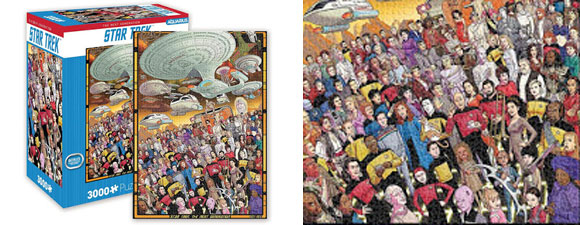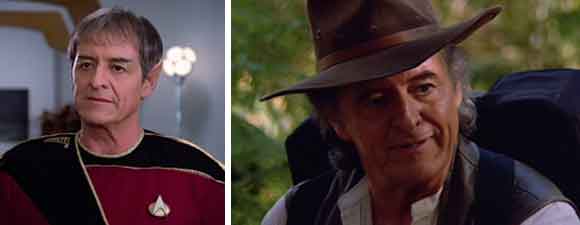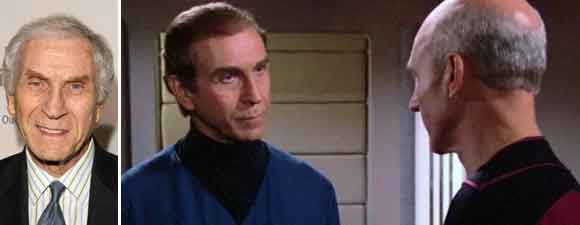Retro Review: Hero Worship
6 min readA young boy who is the sole survivor of a disaster that killed his parents chooses to emulate Data rather than face the facts of the accident.
Plot Summary: Starfleet sends the Enterprise to investigate the disappearance of the research vessel Vico, which was investigating a black cluster when Starfleet lost contact. The Enterprise finds the ship, but it is severely damaged, with several decks exposed to space. Riker, LaForge and Data beam over to try to retrieve the ship’s computer logs and find a young boy trapped under a heavy beam. Data rescues him, though displacing the beam causes the interior of the ship to collapse. The crew learns that the boy’s name is Timothy and that both his parents died when the Vico was destroyed. In sickbay, Timothy asks Data to stay with him and claims that aliens attacked the Vico, firing upon the ship and then boarding it. Picard and LaForge find no evidence that the Vico was invaded, but they cannot retrieve the ship’s logs from its damaged computer files. Troi asks Data to spend some time with Timothy, which she hopes will both help the boy feel safe and give Data an opportunity to learn what really happened to the Vico. Timothy announces that he, too, is an android, with superior strength and no emotions. As the Enterprise investigates the black cluster, shock waves begin to compromise the ship. Each time the crew increases the shields, the waves increase. Though Timothy maintains that the Vico was attacked by strangers, Data tells him that androids do not lie. Then Timothy confesses that he believes he destroyed the Vico by hitting a panel, but Picard assures him that this is not possible and asks for Timothy’s help in saving the Enterprise. Hearing the crew demand stronger shields reminds Timothy that the officers on the Vico did the same thing, which causes Data to realize that each time the Enterprise shields gain power, the waves gain power as well. Suspecting that a harmonic resonance destroyed the Vico, Data asks Picard to drop the shields, which stops the bombardment. Able to cope with having emotions now that he knows he did not cause his parents’ deaths, Timothy decides to be a boy again and stop imitating Data.
Analysis: Though it was probably unwise to air “Hero Worship” so soon after “New Ground,” it also provides an interesting study in contrasts as both Worf and Data unexpectedly take on paternal responsibility for traumatized little boys. Though it’s charming to see Data in such a role, it’s impossible not to notice that all the senior officers on the Enterprise are in dire need of remedial parenting classes – even Crusher, who has a child, and Troi, who as a counselor presumably has some training in working with grieving children. Timothy has suffered an even more terrible loss than Alexander Rozhenko, yet just like Alexander, he is left alone for long periods, dumped in large groups of children in a school setting, and offered no unconditional affection or assurances that he will be loved and cared for – it’s no wonder that the boy latches on to Data, who despite being an android takes the time to reassure Timothy before their treacherous escape from the Vico. Honestly, what’s wrong with these people? Beverly announces that Timothy is well enough to leave sickbay after a cursory checkup, and jokes that Deanna has her work cut out for her — how about, as the ship’s CMO and the mother of a child who lost a parent, she offer some advice, some sympathy, even if she doesn’t want to get involved enough to suggest that Timothy might be better off staying right where he is until they’ve determined just how traumatized he is and whether he’s a risk to himself and others?
Really, Worf suddenly seems like a much better parent after watching “Hero Worship” – he was faced with a child who was much more aggressive, whose defiant behavior posed a threat to the entire ship, rather than merely an inconvenient orphan who’s mostly willing to distract himself with building blocks. Troi wasn’t much more helpful with Alexander but at least she gave lip service to the idea that the boy felt abandoned by his dead parent; Timothy has lost not only his parents but everyone he knew, in a terrible accident that could very well repeat itself aboard the Enterprise. The crew doesn’t need to know he blames himself for causing it to guess that he might be terrified of the same thing all over again. How long was he lying in the wreckage — a couple of days? With his dead mother outside by one of the panels? It’s as though the Enterprise crew has to remain in denial about the full horror of the situation or they’ll wonder, not without reason, whether having children on a starship exploring little-understood black clusters is really such a good idea. I don’t think the writers spent any time thinking about depth or nuance in their rush to play with Mini-Data, but if I were analyzing Crusher’s behavior, I’d guess that she doesn’t really want Timothy around because he makes her remember how a similar situation left Wesley fatherless and how another similar situation could have left him an orphan just like this boy. As for Troi, her withdrawal just makes no sense, but it’s necessary so that Data can become Timothy’s father figure.
Sure, it’s cute to watch a little boy copy Data’s hair and uniform and try to mimic his head movements and speech patterns. Troi can’t help laughing when Timothy says he is operating within normal parameters, and immediately plays along. But she doesn’t repeat her initial question – asking how he feels – trying to work around his defense mechanisms. She could try many of the same lines that Data utters artlessly, reminding Timothy that androids can’t eat chocolate ice cream or feel proud about the wonderful models they built. Since Data has no training as a counselor, it takes much longer for him to get at what’s bothering Timothy, which not incidentally means it also takes much longer to find out about the dire threat to the ship from the Enterprise’s own shields. Data obviously isn’t great with children – he doesn’t know enough not to criticize the boy’s model, then put it together himself at a speed no human could hope to match – but the scenes with Timothy are designed to be adorable rather than moving or realistic. When Timothy starts talking about nightmares, even an android with any psych training would follow that line of conversation rather than announcing that androids don’t have nightmares. An offhand “Oh, I dreamed I blew up the Vico” would have saved everyone a lot of time.
“Hero Worship” isn’t a boring episode to watch; the pacing is steady, the acting is fine – particularly by Joshua Harris, the young boy playing Timothy – and the scientific anomalies in the black cluster are described with a minimum of technobabble, so that the crisis seems real. It was also a good idea not to debunk Timothy’s claims of an attack too soon, since it seems like the Breen might be involved and could decloak at any moment. But most of the humor falls flat because Timothy’s situation is so sad. If a child on the Enterprise decided to be like Data because he was angry or frustrated or blamed himself for some minor disaster, that would have made a great story – we’d have gotten to see the kid’s parent struggle with a flat, smug “I am operating within normal parameters,” and we’d have been secure in the knowledge that whatever was eating at the kid, he had a support system waiting for him when he decided to face his feelings. With Timothy, the depth of his underlying tragedy makes the focus on Data’s clumsiness as a role model seem pretty insensitive. Before he leaves the ship, Timothy should get together with Alexander and discuss how to clue the adults on the bridge in to the needs of the children on their ship.






